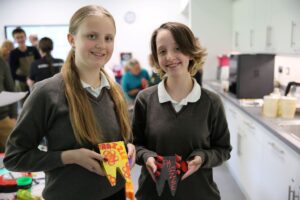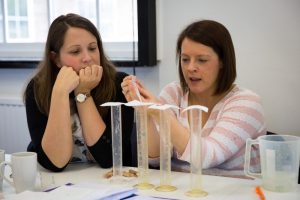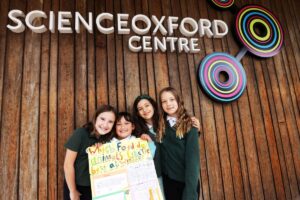Science Takes The Stage As FameLab Oxford Competition 2018 Heats Up
Tuesday 13th March 2018
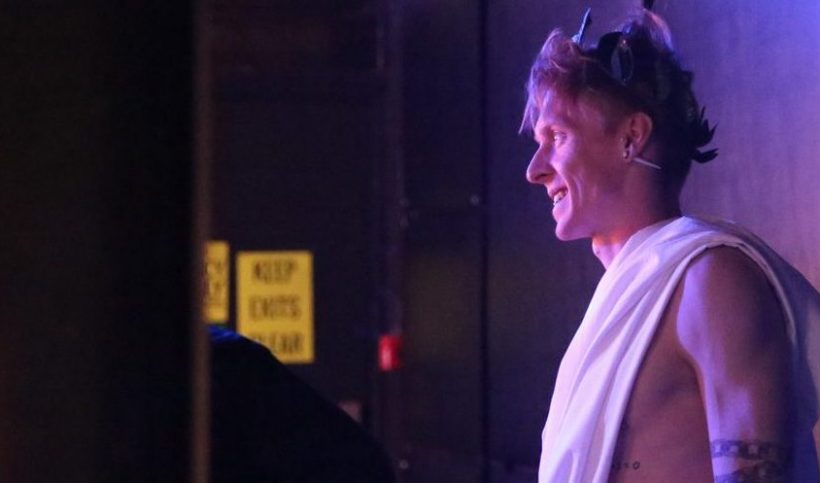
A toga-clad mathematician, a corn-on-the-cob wielding virologist, and the youngest ever countdown competitor walk in to a bar.. Standard Oxford! Find out what happened next..
The FameLab regional final on March 7th saw seven brave competitors take to the stage of The Bullingdon in Oxford to perform like they’d never performed before – having just three minutes to deliver a talk about their area of research with content, clarity and (some would argue most importantly) charisma. Our Events Officer, Rowena Fletcher-Wood reports on an evening of bites, bugs and cornflakes…
It was the 7th of March, gone 7pm
When 7 scientists decided to be brave…
But these were no ordinary folk of the trade
But the FAMELAB competitors of the Oxfordshire stage!
After a hilarious welcome by previous FameLab competitor, physicist and the evening’s compere Rob Shalloo, Chemical biologist James Eaton was first to take to the stage. James gave us a bit of a teaser about the future of quantum computing. Titled the Possibilities of a world we can’t imagine, and explained how computer bits (individual pieces of data) can be both off and on at the same time, but take sides when you look at them. How do they know whether to be on or off? Well creepily, they just know…
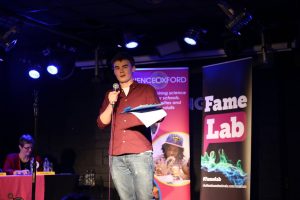
Our compere, Oxford & FameLab UK national finalist + runner-up 2015 Rob Shalloo
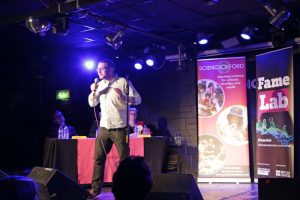
Chemical biologist James Eaton putting a ‘spin’ on quantum computing
Next up was theoreticial physicist Rudin Petossian-Byrne, who used a handy magic trick, performed with the assistance of FameLab judge and ex UK competitor Kyle Evans, to show why turning an electron 360o does not return it to its original state – but turning it 720o does. So how does all this matter in the real world? Well the research is helping scientists to understand more about fundamental particles, how matter bonds and why materials can’t move through each other!
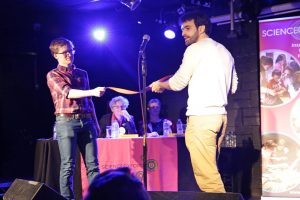
Rudin Petossian-Byrne, Oxford University Dphil in Theoretical Physics gives a belting performance around rotating electrons
Our third competitor, virologist and FameLab veteran Bernadeta Dadonaite, thought FameLab was the golden opportunity to tell us the “The story of the edible gold” – taking on the history of popped corn flakes, the popular breakfast cereal created on this day back in 1897. Far from the sugar-laden delight that is today’s cornflake, however, the cereal was originally designed to be as plain as possible – in the hopes it’s boringness would (brace yourself!) curb masturbation! However, it is the exciting science of GM that Bernadeta feels will bring us the cereals of the future.
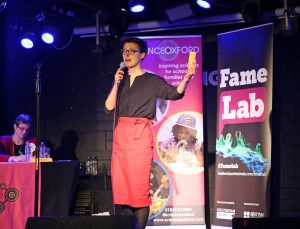
Pop science as Dunn School of Pathology virology PhD student Bernadeta talks GM crops, corn flakes and ‘edible’ gold on #internationalbreakfastcerealday
St Hugh’s mathematician and toga wearer Tom Crawford, better known for his YouTube channel called the Naked Mathematician. He told the tale of Archimedes – who was also familiar with doing science with few of his clothes on. I’m still astonished that the king let Archimedes take his crown into the bath, but I guess that decision has since been displaced by his important findings! As late as the 1970s, scientists were still using his principle to theorise about sinking pingpong balls to the bottom of the ocean – forgetting, of course, that they would be crushed under the pressure.
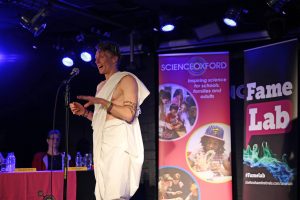
A ping pong ball, pencil sharpener and coins – props for our ‘usually’ Naked Mathematician Tom Crawford
The topic now spiralled round to galaxies with Oxford University astrophysicist Mike Walmsley. Starting from the minds that make programmes to classify them, Mike put computer programmers under telescopic scrutiny to uncover how AI can inherit the unconscious bias from its creator. It turns out the way you teach an AI device to learn can change what they think. Applying this knowledge to galaxies, Mike suggested that AI devices might be detecting new galaxies based on what the scientist who is programming them thinks a galaxy should look like i.e. a beautiful spiral.
.
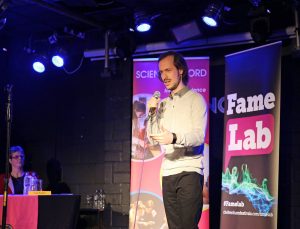
Astrophysicist DPhil Mike talks laws of attraction across galaxies but “possibly spends too much time looking at them”..
Medical doctor and (it turns out!) youngest ever countdown competitor, Lucy Guile was up next. Bugged by the squeaky clean culture that may be the cause of a 700% increase in allergic reactions, she was determined to teach us why the five- second rule is a good thing! Taking a tour through the microbiome and immune system, Lucy gave us some tips about when its safe to pick that doughnut up off the floor and eat it and when to bin it, with a few numbers thrown in for good measure.
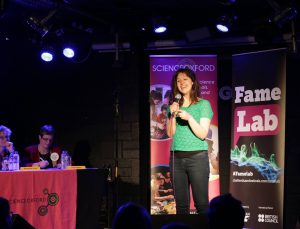
Jungle VIP and Junior Doctor, Lucy Guile talks bugs and the 5 second rule..
Last but not least was our ghost storyteller of the evening, Mubeen Goolam, whose biological translation of gene imprinting was as hair-raising as curious. Who would have thought that two distinct diseases, Prada Wili and Angelman syndrome, are the result of the same gene deletion? It’s not an error, Mubeen explains, but happens because your genes (like the bits we heard about at the start) remember which parent they came from! Similarly, what you eat and how you live your life could affect your children or grandchildren, like a famine that comes back to bite the next generation.
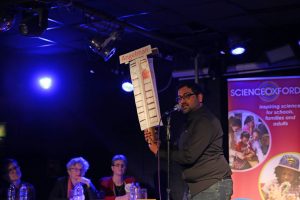
Postdoctoral research assistant at Dunn School of Pathology Dr Mubeen Goolam wins laughs with his biological ghost story
Our judges were Robot wars host Lucy Rogers, biographer and science broadcaster Georgina Ferry, and folk mathematician Kyle Evans, who all vied for the best puns to round off the evening. And while they deliberated over the winner and runner-up in the FameLab green room, the audience were entertained by scientist and worm fan Alison Woollard, who had everyone in stitches as she told of her adventures in the laboratory with an infectious hilarity.
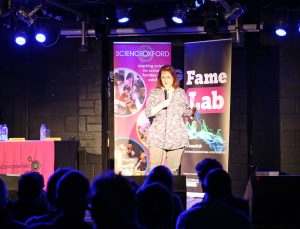
Oxford University geneticist and one of Britain’s top biologists Alison Woollard ‘has the performing bug’..
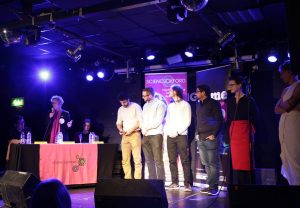
Our 2018 contestants hear the judges critique and top tips..
The results!
Doctor Lucy picked up the top prize, and will head to the UK Final in the London Science Museum on April 25th! Bernadeta celebrated not only International Breakfast Cereal Day, but also her position as FameLab runner up. Be sure and tune in for the finals!
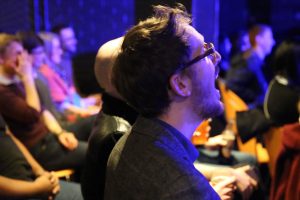
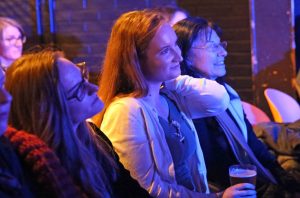
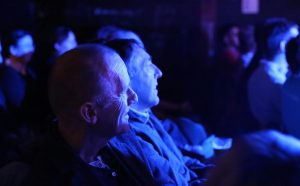
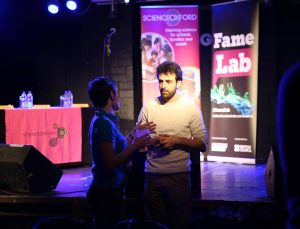
Rowena gives some tips and advice to contestant Rudin ahead of his performance

